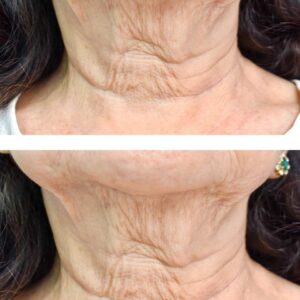Can a spider poo? A mother turned to Facebook seeking guidance as she expressed her confusion
over discovering a set of black droppings scattered throughout her home. Posting on a Mrs.

Hinch fan page, she shared a series of images revealing peculiar black specks along her skirting board and wall.
Spider poo on the skirting of a home
“Anyone have any idea what this is?” She asked. “Just appeared this last week
or so on the skirting board in my dining room, also bits on the wallpaper and the floor which
gets mopped every day! It’s not bumpy, it looks like some sort of paint splatter but it isn’t.” She continued.
Fellow enthusiasts of Mrs. Hinch promptly came to the rescue, with users confidently asserting that the markings were indeed spider droppings. One wrote: “It happens a lot this time of year, spiders pooing everywhere, Dettox spray is good for it.” While another said: “It’s spider poo after they’ve eaten flies. I get it on my window sill.” Others said it could have been “fly poo” while one user was adamant, it was “spider poo for defs”.

What do the experts say?
According to various sources offering advice on pests, spiders typically do not leave solid droppings; instead, their excrement is thick and liquid in consistency, resembling dark ink stains. These markings often appear on walls and surfaces.
Spider feces are not solid; instead, they appear as dark stains or drips on walls and surfaces. The specific appearance of the droppings varies among spider species, making it challenging for the untrained eye to distinguish.
Typically, spider poop accumulates in a specific location below their web, often in corners with cobwebs on walls. Since spiders seek dark or undisturbed places for refuge, their droppings may unexpectedly appear in various locations. The size of spider droppings is approximately that of a pinhead, and they exhibit a monotone color, with variations in white, black, gray, or brown hues.
Is spider poo dangerous to handle?
While spider poop is not proven to transmit pathogens, it is advisable to treat it with caution and handle it as if it were potentially toxic. Studies indicate that pathogens ingested by spiders do not typically pass on through their droppings.
Nevertheless, it’s important to exercise caution and thoroughly wash hands with soap and water after handling spider feces. Cleaning fresh spider droppings is easier, while dried ones may require more effort to remove and may leave behind yellow stains.
It’s essential to note that cleaning up spider poop does not eliminate the spiders responsible for it. To prevent the reappearance of droppings, taking action against these creatures is necessary. Maintaining a highly tidy environment and removing every spider web you encounter is a good starting point. There are also products available to assist with infestations, and professional pest control services are well-equipped to handle such situations.





